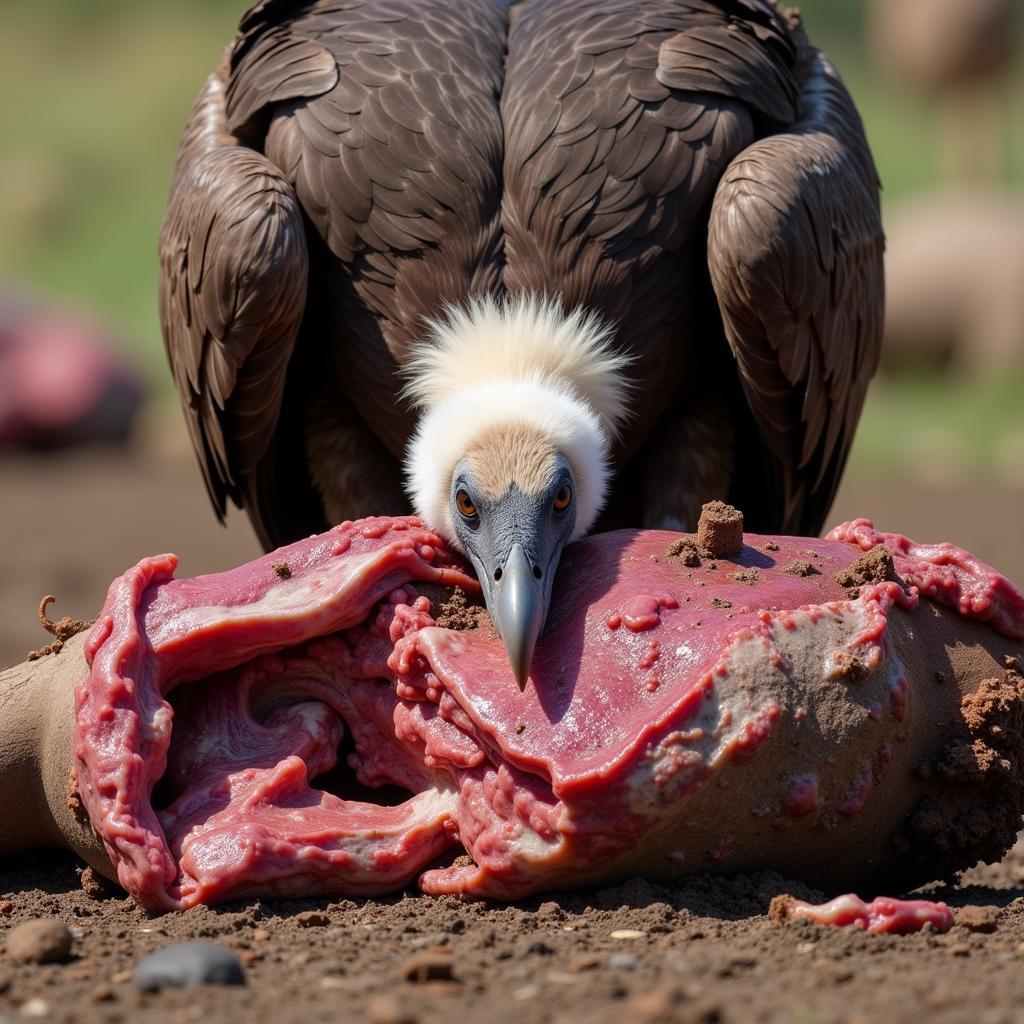African Vulture: Soaring Scavengers of the Savanna
African Vultures, with their imposing wingspans and often-misunderstood habits, are a crucial part of the continent’s ecosystem. Often seen circling high above the savanna, these birds of prey play a vital role in maintaining the delicate balance of nature.
Unveiling the Misunderstood: Why African Vultures Matter
While their appearance might not inspire admiration like a lion’s mane or an elephant’s tusks, African vultures are essential to a healthy environment. As nature’s cleanup crew, they feast on carrion – the carcasses of dead animals. This often-overlooked ecological service helps prevent the spread of diseases like anthrax and rabies, which can decimate wildlife populations and even impact human communities.
 African white-backed vulture feeding on carrion
African white-backed vulture feeding on carrion
A Diversity of Scavengers: Exploring the Different Species
Africa is home to eleven vulture species, each with its own unique characteristics and ecological niche. From the majestic Lappet-faced Vulture, with its massive wingspan reaching almost 10 feet, to the smaller Hooded Vulture, often found scavenging near human settlements, these birds showcase the diversity of African wildlife.
The Egyptian Vulture: A Cultural Icon
One species, the Egyptian Vulture, holds a special place in African culture. Often depicted in ancient Egyptian hieroglyphs, this bird was revered as a symbol of motherhood and protection.
Facing the Threats: The Plight of African Vultures
Sadly, African vultures are facing an unprecedented crisis. Their populations are plummeting across the continent due to a combination of threats, including:
- Poisoning: Unintentionally or deliberately poisoned carcasses, often targeting other animals, are a major cause of death.
- Habitat Loss: As human populations expand, vulture habitats are being destroyed or fragmented.
- Traditional Medicine: In some regions, vultures are hunted for their body parts, believed to have medicinal properties.
The decline of African vultures has far-reaching consequences. Without these efficient scavengers, carcasses decompose slowly, increasing the risk of disease outbreaks and disrupting the delicate balance of the ecosystem.
Conservation Efforts: Protecting Africa’s Soaring Scavengers
Recognizing the crucial role of vultures, various organizations and communities are working tirelessly to conserve these magnificent birds. Efforts include:
- Anti-poisoning campaigns: Raising awareness about the dangers of poisoning and promoting safe alternatives.
- Habitat protection and restoration: Establishing protected areas and restoring degraded habitats.
- Community engagement: Working with local communities to reduce vulture poisoning and promote coexistence.
The Future of African Vultures: A Shared Responsibility
Protecting African vultures is not just the responsibility of conservationists; it requires a collective effort. By understanding the vital role these birds play and supporting conservation initiatives, we can help ensure that these magnificent creatures continue to soar above the African savanna for generations to come.
FAQs: Understanding African Vultures
What is the wingspan of an African vulture?
The wingspan of African vultures varies depending on the species. The largest, the Lappet-faced Vulture, can have a wingspan of up to 10 feet, while smaller species like the Hooded Vulture have a wingspan of around 5 feet.
What is the role of vultures in the African food chain examples?
Vultures are scavengers, meaning they feed primarily on carrion, the carcasses of dead animals. This important role makes them nature’s cleanup crew, preventing the spread of diseases and maintaining a healthy ecosystem.
Are African vultures dangerous to humans?
No, African vultures are not dangerous to humans. They are shy birds that avoid confrontation and pose no threat to people.
How can I help protect African vultures?
You can support conservation organizations working to protect vultures, spread awareness about the importance of vultures and the threats they face, and advocate for responsible land management practices that protect vulture habitats.
Discover More about African Wildlife
Interested in learning more about the fascinating creatures that inhabit Africa? Explore our other articles:
For any inquiries or assistance, please contact us at:
- Phone Number: +255768904061
- Email: kaka.mag@gmail.com
- Address: Mbarali DC Mawindi, Kangaga, Tanzania.
Our dedicated customer service team is available 24/7 to assist you.

